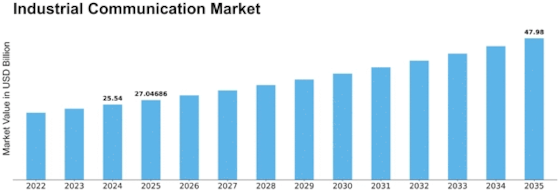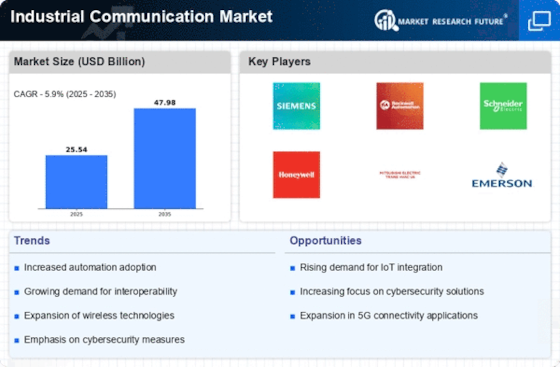Industrial Communication Size
Industrial Communication Market Growth Projections and Opportunities
The Industrial Communication Market is a dynamic sector influenced by various market factors that shape its growth and trajectory. One crucial factor is the increasing demand for automation across industries. As businesses strive for greater efficiency and productivity, there is a growing need for seamless communication among industrial devices and systems. This demand has spurred the adoption of advanced communication technologies to facilitate efficient data exchange and control processes in industrial settings.
Technological advancements play a pivotal role in shaping the Industrial Communication Market. The rapid evolution of communication protocols and networking technologies has enabled faster and more reliable data transfer in industrial environments. The shift towards Industry 4.0, characterized by the integration of digital technologies, IoT devices, and smart manufacturing, further propels the market forward. Industrial communication solutions are essential components in achieving the interconnected and intelligent systems envisioned by Industry 4.0.
Globalization has also become a significant market factor influencing industrial communication. As industries expand their operations globally, the need for standardized communication protocols becomes imperative. Compatibility and interoperability across different regions and industries drive the adoption of communication standards that facilitate seamless integration of diverse industrial systems. This global perspective has led to the widespread use of communication technologies that can transcend geographical boundaries and ensure a standardized approach to industrial connectivity.
The Industrial Communication Market is deeply impacted by the diverse requirements of various verticals, including manufacturing, energy, automotive, and healthcare. Each industry has unique communication needs, and market players strive to offer tailored solutions to address specific challenges. For instance, the manufacturing sector may prioritize real-time communication for process control, while the energy industry may focus on reliable data transfer for monitoring and maintenance of critical infrastructure.
Cybersecurity has emerged as a critical market factor in the Industrial Communication sector. With the increasing connectivity of industrial devices and systems, there is a heightened risk of cyber threats. As a result, industrial communication solutions must prioritize robust cybersecurity measures to safeguard sensitive data and ensure the uninterrupted operation of critical industrial processes. The integration of secure communication protocols and the implementation of advanced cybersecurity solutions are crucial aspects of addressing these challenges.
Cost considerations play a pivotal role in the adoption of industrial communication solutions. While there is a growing recognition of the benefits associated with advanced communication technologies, businesses also evaluate the economic feasibility of implementation. The cost-effectiveness of communication solutions, including hardware, software, and maintenance, significantly influences the decision-making process for industries looking to upgrade their communication infrastructure.
Regulatory standards and compliance requirements are integral market factors shaping the Industrial Communication Market. Governments and industry bodies often establish guidelines and standards to ensure the safety, reliability, and interoperability of industrial communication systems. Adherence to these regulations is not only a legal necessity but also a market differentiator, as businesses seek solutions that meet or exceed industry standards.


















Leave a Comment